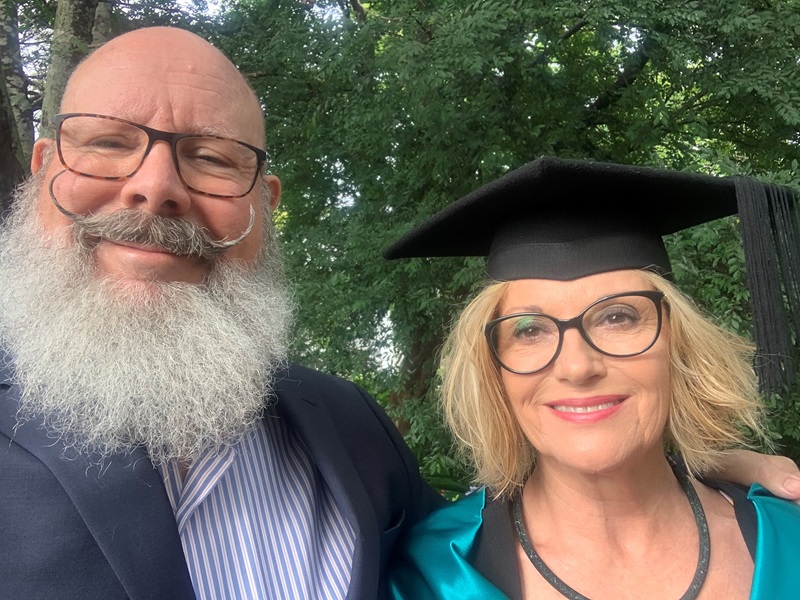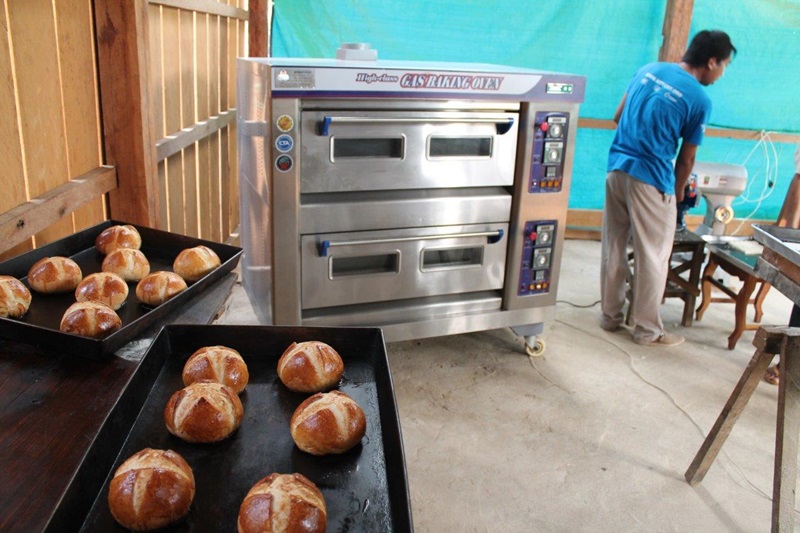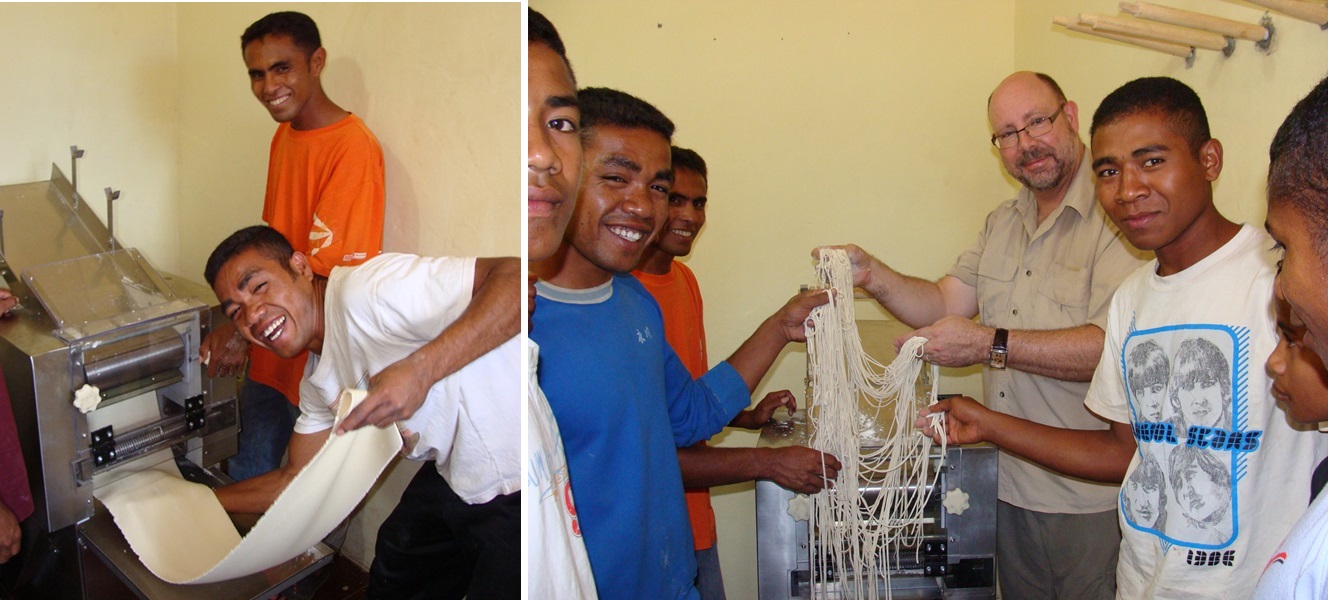 John Menzies celebrating his wife’s 2020 graduation.
John Menzies celebrating his wife’s 2020 graduation.
Leading with innovation, grounded in mentorship
John Menzies describes himself as “an accidental food technologist,” but the path he’s taken suggests otherwise. From being expelled from school at 15 to leading cutting-edge food innovation at Sanitarium Health Food Company, his career spans more than five decades of impact, persistence, and transformation.
Born in Armidale, New South Wales in 1955, John grew up in the small town of Cooranbong, “aptly named, the Aboriginal meaning is ‘place of many flies,’” he laughs. After a short stint in construction, John’s career trajectory shifted dramatically following a motorbike accident. “I busted my arm, which wasn’t great for building,” he recalls. A friend pointed him toward a laboratory technician course sponsored by Sanitarium and thus began a lifetime in food science.
After completing the two-year technician course, John was assigned to Sanitarium’s Longburn factory in Palmerston North, New Zealand in 1975, as a quality control technician. It was during his time in New Zealand that Massey University entered his life in an unexpected way.
Inspired at Massey: the turning point
Occasionally visiting Massey University to access equipment and expertise for his factory projects, John met the late Professor Emerita Mary Earle, a stalwart of Food Technology at Massey. “She used to call me ‘John Mingus’ – the proper Gaelic pronunciation of Menzies,” he smiles. “She kept on getting on my case: ‘Why don’t you do a bit more, John? You seem to be more than a lab technician.”
That gentle insistence changed everything. “I was going through a divorce and remarried to a Kiwi girl. I decided to make a change in my life. So, I went to Massey as a mature student. When I graduated in 1985, I was 30, very old in those student years at that time.”
The journey wasn’t easy. John had never studied calculus, and with no formal STEM beyond Year 10, he had to work twice as hard. “I remember saying to my wife, ‘I can’t do this.’ And she said, ‘Yes, you can.’” He taught himself advanced maths from scratch, borrowing textbooks and learning foundational science through the Massey library before stepping into classrooms.
John worked part-time at Massey’s research centre and studied part-time until earning enough high-grade passes to gain full-time entry. Then life threw another challenge: “Our first son was born during my second year. He was blind, deaf, incontinent, and had continual fits. It took hours to feed him. My wife couldn’t work as she had to care for him full time.”
Exams often coincided with medical emergencies. “It seemed like every time the exams came up, my son would decide he was going to die. I’d be in the hospital trying to cuddle him and keep him alive,” John recalls.
Despite these immense pressures, he graduated with Honours in Food Technology at the top of his class. “I just worked really, really hard. When they were teaching me, I could relate it to what I’d seen in the factory. That practical grounding made all the difference.”
John credits Massey’s unique balance of theory and practice as the foundation of his career. “Massey had both high-end academics and practical pilot plant work. We learned engineering, microbiology, marketing, and sensory science. It was the most comprehensive food technology education you could get.”
“That’s what I loved about Massey, it had a real can-do approach. You often had to choose between academic and more practical universities in Australia. Massey had both,” he emphasises. “They covered high-level academic content – maths, micro, advanced food science, but also gave us real experience in pilot plants and industry-relevant labs. And they didn’t stop there. They taught us the marketing side too. That meant when I started working in cross-functional teams, I could collaborate with marketing, not be steamrolled by them. I could understand their perspective and contribute meaningfully to the discussion.”
This breadth, he says, was critical. “Massey gave me an incredible background. It wasn’t just about learning how to make food, it was learning how to innovate, think across systems, and connect the science with consumer experience and business needs.”
Launching global ventures and innovating with purpose
After graduating, John returned to Australia in 1985 and completed a Master of Applied Science in Food Science while working full-time. He later went on to launch a successful health food company in Hong Kong. He helped scale LongaLife Vegetarian Products in Australia from $500K to over $5 million before it was acquired by Sanitarium in 1998.
Back at Sanitarium, John took the reins as R&D Manager for the Meals and Beverages division and helped guide the development of some of the most iconic products in the Australasian market. “I was there through the big growth phase of So Good and Up&Go,” he says. “Up&Go started as the idea that a Tetra Pak drink could deliver the nutrition of two Weet-Bix with milk. Now it’s the number one breakfast brand in Australia and New Zealand.”
In 2018, John joined The Incubator, a sub-department of Sanitarium’s Development and Innovation group that aimed to explore and accelerate disruptive innovations. “Big companies are good at running known processes, but introducing something new can be painfully slow and disruptive to existing production platforms. We wanted a space where ideas could move faster.”
Projects ranged from high-pressure processing (HPP) smoothies to developing novel beverages and foods. One standout initiative, the smoothie range, involved wholefood plant-based blends of vegetables and fruits processed using HPP to achieve six-month chilled shelf lives. Though commercially viable scaling proved too costly, the pilot project validated key insights that inform future strategies.
In 2023, The Incubator merged with the Advanced Nutrition team to form the Futures Group, a dedicated unit exploring horizon-three innovations – those five to ten years ahead of market readiness. “We’re looking at UVC pasteurisation, nano-emulsions, cold plasma, even precision fermentation of casein proteins. These are the technologies that might define food in the next decade,” John explains.
 Cambodia
Cambodia
Mentoring the next generation of innovators
Beyond the lab, John is passionate about mentoring young scientists. “There are several young people on our team, with only a few years of experience when they started with us. They wouldn’t get these opportunities in a traditional R&D team,” he says. “I don’t tell them what to do. I ask what they want to try, and I help them get there. Obviously, if its brand-new technologies, I step into a teaching mode.”
His understanding of generational differences shapes his philosophy. “Gen Zs want to be heard. Feedback has to be a two-way conversation. You can’t lead with hierarchy, you have to lead with trust.”
He also set up an in-house microbiology lab to accelerate results and learning and empower junior staff. “I taught one young scientist everything from total plate counts to UV light-scattering techniques. Now she runs complex analyses independently. I’m so proud of her.”
John has also brought his expertise to humanitarian efforts in Cambodia and Indonesia through ADRA (Adventist Development and Relief Agency) and Mercy Indonesia, respectively. In Cambodia, he co-developed fortified bread and noodle premixes distributed in malnourished communities. In Indonesia, he introduced noodle production techniques in remote areas to help children’s homes build self-sustaining micro-enterprises.
“These projects meant I could use what I know to benefit people who would otherwise never have access to this kind of knowledge. That’s something really special.”
 Mercy Indonesia Soe noodles
Mercy Indonesia Soe noodles
A lifelong learner
Never one to stop learning, John became Australia’s first Certified Culinary Scientist through the US-based Research Chefs Association. “I trained alongside chefs at TAFE for a year, then sat a culinary exam in the US, all in ounces and Fahrenheit!” he laughs. “That qualification opened up new ways to connect culinary arts with food technology.”
He also trained in food pairing and continues to promote “culinology” as a critical field in food innovation.
John’s advice to students is simple but wise: “Don’t expect everything straight away. Sometimes, a little patience and delayed gratification would be helpful. Learn everything you can, stay curious, and be ready to serve, not just succeed.”